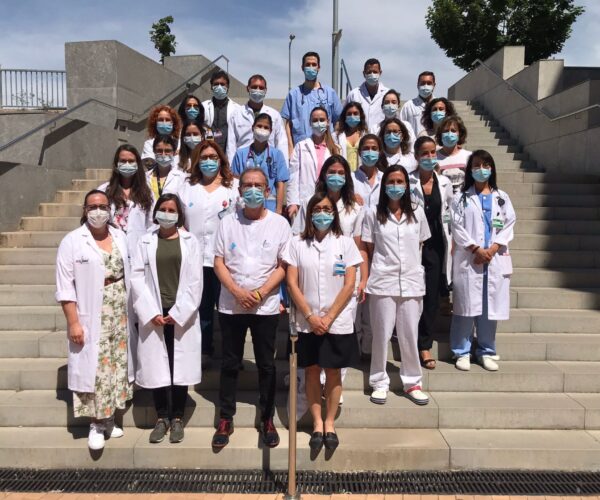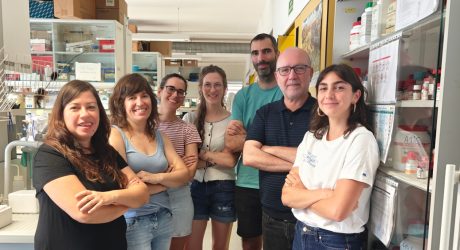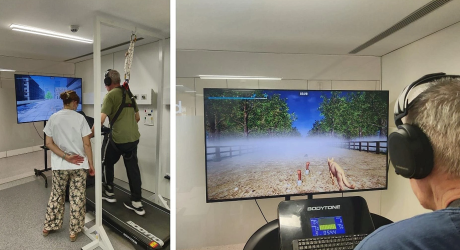MicroRNA profile defined as a biomarker to predict progression of COVID-19 in severe patients
According to research led in Lleida by the Translational Research in Respiratory Medicine group at IRBLleida, the University of Lleida, the Arnau de Vilanova and Santa Maria de Lleida Hospitals, and CIBERES
A microRNA profile, small ribonucleic acid sequences, predicts the severity of COVID-19 in critically ill patients, according to research led from Lleida, which has recently been published in the journal Translational Research. The Translational Research in Respiratory Medicine group, made up of professionals from the Institute for Research in Biomedicine of Lleida (IRBLleida), the University of Lleida, the Arnau de Vilanova University Hospital of Lleida (HUAV) and the University Hospital of Santa Maria de Lleida (HUSM), and the Centro de Investigación Biomédica en Red Enfermedades Respiratorias (CIBERES) of the Instituto de Salud Carlos III, has led this research that has defined microRNA profiles associated with the severity of COVID-19 and mortality in Intensive Care Units (ICU).
The observational study was conducted in five Spanish hospitals (Hospital Universitario Arnau de Vilanova and Hospital Universitario Santa María de Lleida, Hospital Clínico Universitario de Valladolid, Hospital Universitario del Río Hortega de Valladolid, Hospital General Universitario Gregorio Marañón de Madrid and Hospital Universitario Infanta Leonor de Madrid) participating in the CIBERESUCICOVID study. The study has analysed the evolution and mortality of a total of 84 patients, including 37 admitted to intensive care units, recruited during the first pandemic wave, from March to June 2020.
“The identification of biomarkers to assist in the management of COVID-19 is a priority in current research,” explained the first author of the publication and Miguel Servet researcher, David de Gonzalo. “Thanks to this finding, we may be able to predict severity in patients affected by SARS-CoV-2 and prevent its progression,” confirmed de Gonzalo.
“We observed differences in the expression profile of ten circulating microRNAs in ICU patients compared to ward patients, and thanks to their analysis, we identified a signature of three microRNAs that discriminated between the two study groups,” he confirmed. In addition, the study also found that patients who died had a specific profile of six circulating microRNAs.
A paper from this study, entitled ‘MicroRNA expression profile as a potential blood-based biomarker of COVID-19 severity’, won first prize as a paper at the 4th Conference on Basic Research in Pneumology, organised by the Catalan Society of Pneumology of the Academy of Medical and Health Sciences of Catalonia and the Balearic Islands.
The study also involved the collaboration of research staff from the Precision Medicine in Chronic Diseases group at IRBLleida, the Río Hortega University Hospital in Valladolid, the Institute of Biomedical Research of Salamanca (IBSAL), the University Clinical Hospital of Valladolid, the Gregorio Marañón University General Hospital in Madrid, the Infanta Leonor University Hospital in Madrid, the Vall d’Hebron University Hospital in Barcelona, the Vall d’Hebron Research Institute (VHIR), the Hospital Clínic, the August Pi i Sunyer Biomedical Research Institute (IDIBAPS), the La Fe University and Polytechnic Hospital in Valencia, the Barcelona Supercomputing Center (BSC) and the Getafe University Hospital in Madrid.
This research has been possible thanks to a grant from the Instituto de Salud Carlos III (CIBERESUCICOVID-COV20/00110), and the European grant ERDF, “A way of doing Europe”. The research staff also received a Miguel Servet 2020 grant (CP20/00041), an ‘Investing in your future’ grant from the European Social Fund (ESF), a pre-doctoral grant from the Ministry of Universities (FPU19/03526) and support from the IRBLleida Biobank (B.0000682) and the Biobanks Platform (PT17/0015/0027).




